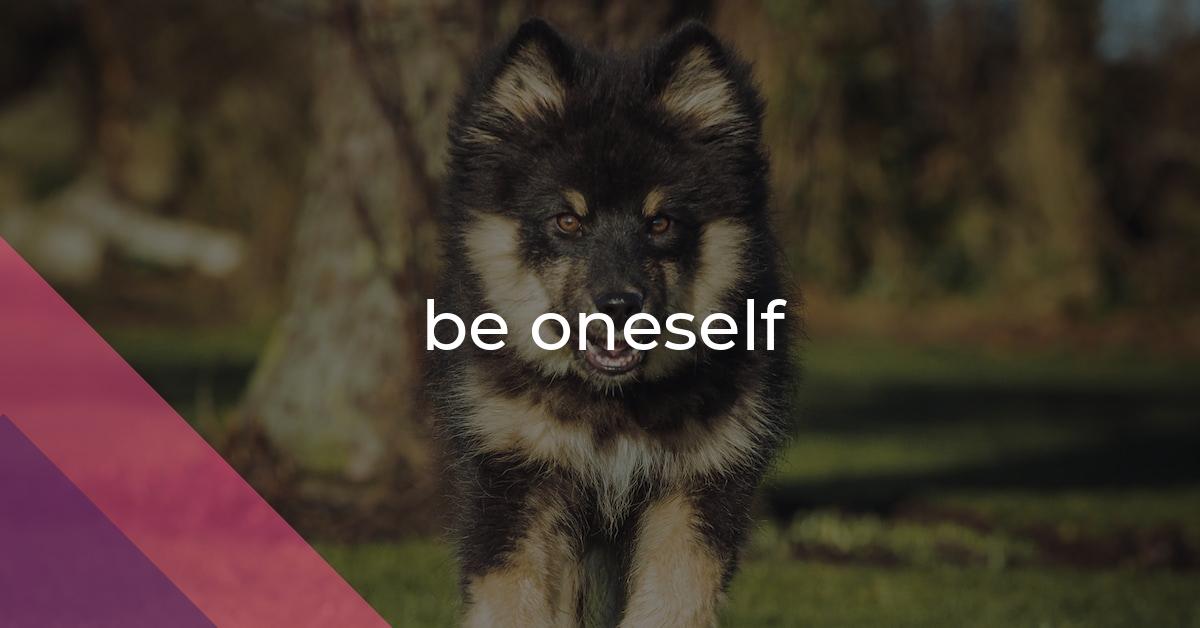be oneself: Idiom Meaning and Origin
What does ‘be oneself’ mean?
The idiom "be oneself" means to act or behave in a natural or authentic way, without pretending or trying to be someone or something else.

Idiom Explorer
The idiom "to be honest" means to speak or express one's true thoughts, opinions, or feelings without deception or dishonesty.
The idiom "keep it real" means to stay true to oneself, be genuine, and not pretend to be something or someone else.
The idiom "carry oneself" refers to how one behaves and presents themselves in a particular manner or situation.
The idiom "buck up" means to encourage or motivate oneself or someone else to improve their attitude or behavior, especially in difficult or challenging situations.
The idiom "bring about" means to cause or make something happen, often used to describe the action of initiating or producing a particular result or change.
The idiom "born and bred" means being born and raised in a particular place, indicating strong ties and familiarity with that place.
The idiom "bend to one's will" means to make someone do what you want or to surrender to your control or influence.
The idiom "be like" is used to describe a way of speaking or acting that imitates someone or something. It is often used in informal conversation or internet slang to mimic the behavior or mannerisms of a person or character.
The idiom "bear oneself" means to behave or conduct oneself in a particular way in a given situation.
The idiom "anything goes" means that there are no limits or restrictions on what is acceptable or allowed in a particular situation. It implies a wide range of possibilities and a lack of rules or standards.
Decoding Individual Authenticity
In the world of idioms, "be oneself" is a commonly used phrase that emphasizes the importance of authenticity and staying true to one's own character, values, and beliefs. It encourages individuals to embrace their unique qualities, regardless of societal expectations or pressures. This idiom reminds us to remain genuine, confident, and true to our own nature in various situations.
The origins of the idiom "be oneself" can be traced back to the late 19th century. While its exact source or creator remains unclear, its usage and understanding have evolved over time. It has become deeply ingrained in the English language, used by people from different walks of life, with a broad range of implications.
When someone advises you to "be oneself," it suggests that you should not try to imitate or emulate others. The idiom discourages the need for conformity or assimilation and instead promotes self-acceptance and self-expression. It encourages you to showcase your genuine identity without fear of judgment or rejection.
The idiom "be oneself" highlights the significance of individuality and the importance of embracing and celebrating our unique qualities. It advocates for staying true to who we are instead of trying to fit into societal molds or conform to others' expectations.
Furthermore, "be oneself" emphasizes the value of self-awareness and self-confidence. It suggests that we should have a deep understanding of our own values, interests, and aspirations to make decisions that align with our authentic selves. This idiom encourages us to stand firm in our beliefs and not compromise on our principles for the sake of societal approval.
While the idiom "be oneself" promotes personal authenticity, it also acknowledges the challenges that may arise in doing so. The pressures of society, the desire for acceptance, and the fear of judgment can all influence our ability to be true to ourselves. However, by internalizing this idiom, we can find the strength to resist these external influences and stay true to our genuine identity.
The idiom "be oneself" serves as a powerful reminder to individuals to embrace and celebrate their unique qualities. It signifies the importance of authenticity, self-acceptance, and self-expression in the face of societal pressures. By remaining true to oneself, we can lead more fulfilling, meaningful lives.
In addition to the idiom "be oneself," there are related idioms that further emphasize the concept of authenticity and staying true to oneself. One such idiom is "keep it real." This idiom encourages individuals to be genuine, honest, and authentic in their words and actions. It emphasizes the importance of not pretending or putting on a false persona, but instead being true to one's real self.
Another related idiom is "bear oneself." This idiom refers to how a person conducts themselves or behaves. It suggests that individuals should carry themselves with honesty, integrity, and authenticity. By bearing oneself in this manner, individuals can represent their genuine character and values to others.
Both the idioms "keep it real" and "bear oneself" align with the concept of "be oneself" in promoting authenticity, honesty, and staying true to one's genuine identity. They encourage individuals to embrace their unique qualities, act honestly, and be true to who they are in various situations.
The idiom "be oneself" encapsulates the complexities of human identity and the ongoing journey to discover and express one's true self. It reminds us to be true to our own character, values, and beliefs, and to embrace our unique qualities. By doing so, we can navigate through life with authenticity, confidence, and a sense of fulfillment.
Example usage
Examples of how the idiom "be oneself" can be used in a sentence:
- After a long day at work, she was finally able to relax and be herself.
- I love spending time alone, it allows me to unwind and just be myself.
- When she's on stage, she has the ability to let go of any inhibitions and truly be herself.
More "Category" idioms



